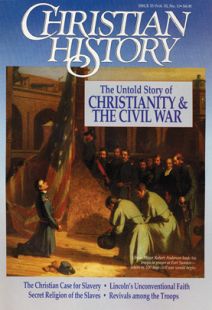Lincoln’s Life — And Key Religious Statements
1809:Feb.12: born near Hodgenville, Kentucky
1816: Moves with family to near Pigeon Creek, Indiana
1828/1831: Flatboat trips to New Orleans (during which he may have reflected on slavery)
1830: Moves with family to west of Decatur, Illinois
1831: Moves to New Salem, Illinois
1832: Captain of militia in Black Hawk War (sees no action)
1834–1842: Member of Illinois House of Representatives
1836: Licensed to practice law
1837: Moves to Springfield, Illinois
1842:Nov. 4: Marries Mary Todd. They bear four sons: Robert (1843–1926), Edward (1846–1850), William (1850–1862), and Thomas (“Tad”; 1853–1871)
1846: Handbill during Congressional campaign denies rumor that Lincoln has ever spoken against Scripture, “religion in general, or . . . any denomination of Christians in particular”
1847–1849: U.S. Representative from Illinois
1851: During his father’s last illness, asks step-brother to urge his father “to call upon, and confide in, our great, and good, and merciful Maker; who will not turn away from him in any extremity.”
1854: Passage of Kansas-Nebraska Act (repealing earlier restrictions on slave extension) rekindles Lincoln’s interest in national politics
1858: Debates with Stephen A. Douglas in race for U.S. Senate seat from Illinois; employs many biblical references and several times corrects Douglas’s inaccurate use of the Bible
1860: Delivers speech in New York that propels him to forefront of Republican party; May: nominated Republican candidate for president; Nov.: elected president (with minority of popular votes) in election with three other candidates
1861: Leaves Springfield after stirring address at train depot, including these words: “Without the assistance of that Divine Being . . . I cannot succeed. With that assistance, I cannot fail”; Mar. 4: inaugurated president; Apr. 12: firing on Fort Sumter (Charleston, South Carolina) begins Civil War
1862: Muses privately that in the Civil War “God’s purposes” may be “something different from the purpose of either party”
1863:Jan. 1: Emancipation Proclamation frees all slaves in areas still in active rebellion against the Union; Mar. 30:proclaims national fast and says that as a nation, “we have forgotten God. We have forgotten the gracious hand which preserved us . . . and have vainly imagined, in the deceitfulness of our hearts, that all these blessings were produced by some superior wisdom and virtue of our own”; Oct. 24: tells delegation of Presbyterians from Baltimore, “I have often wished that I was a more devout man than I am. Nevertheless, amid the greatest difficulties of my Administration, when I could not see any other resort, I would place my whole reliance in God, knowing that all would go well, and that He would decide for the right”; Nov. 19: Gettysburg Address
1864: Tells group of African-Americans who have given him a special presentation Bible, “In regard to this Great Book, I have but to say, it is the best gift God has given to man. All the good the Saviour gave to the world was communicated through this book. But for it we could not know right from wrong. All things most desirable for man’s welfare, here and hereafter, are to be found portrayed in it”; Nov.: reelected
1865:Mar. 4: In Second Inaugural Address Lincoln says that both North and South “read the same Bible, and pray to the same God,” and also (quoting Ps. 19:9) that even if God should let the war continue until “every drop of blood drawn with the [slaver’s] lash, shall be paid by another drawn with the sword . . . still it must be said ‘the judgments of the Lord are true and righteous altogether’ ”; Apr. 15: dies from gunshot wound inflicted the previous day
By Mark A. Noll
[Christian History originally published this article in Christian History Issue #33 in 1992]
Dr. Mark A. Noll is McManis Professor of Christian Thought at Wheaton (Illinois) College and a member of the editorial advisory board of CHRISTIAN HISTORY. His most recent book is A History of Christianity in the United States and Canada (Eerdmans, 1992).Next articles
Headed for Heaven or Hell?
How would Lincoln answer? His political opponent, a famous frontier preacher, wanted to know.
the EditorsChristianity and the Civil War: A Gallery of Firebrands and Visionaries
Leading people in religion and politics during the Civil War era.
Mark GalliChristianity and the Civil War: A Gallery of Other Key Figures
Some people of influence during the Civil War.
the EditorsAmerican Slavery: How Bad Was It?
Selections from the most powerful anti-slavery pamphlet ever written.
Theodore WeldSupport us
Christian History Institute (CHI) is a non-profit Pennsylvania corporation founded in 1982. Your donations support the continuation of this ministry
Donate



